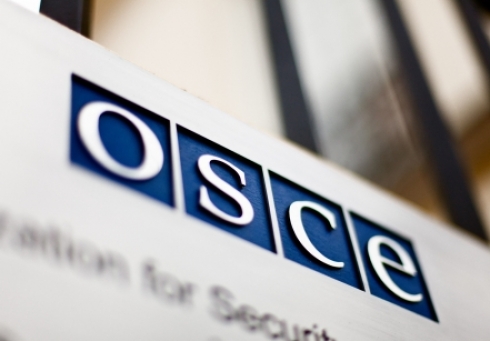Ceasefire violations in focus of OSCE talks on Nagorno-Karabakh

By Sara Rajabova
The OSCE Minsk Group co-chairs continue negotiations over Nagorno-Karabakh conflict. This comes amid escalation of ceasefire violations on the contact line between Armenian and Azerbaijani troops.
In the wake of recent ceasefire violations on the frontline, the co-chairs, Igor Popov of Russia, Jacques Faure of France, and James Warlick of the U.S. and the Personal Representative of the OSCE Chairperson-in-Office, Ambassador Andrzej Kasprzyk, traveled to Baku and Yerevan February 4-5.
In Baku, the co-chairs met with Azerbaijani Defense Minister Zakir Hasanov. During the meeting, Hasanov emphasized that Azerbaijan will never remain silent to Armenia's occupation, and preserves the right to free its occupied lands.
He also pointed to the Armenian occupation of Azerbaijani lands and blamed international community for being passive towards the refugees and IDPs' problems.
Hasanov also noted that Baku supports the peaceful settlement of the conflict. He briefed the visiting delegation on the deterioration of situation on the frontline and the shelling of Azerbaijani settlements and civilians by the enemy.
The Minsk Group mediators also met Azerbaijani President Ilham Aliyev and Foreign Minister Elmar Mammadyarov.
Mammadyarov also emphasized on Baku's will to continue negotiations to achieve progress in resolving the Karabakh conflict.
The co-chairs left Baku on February 5 for Yerevan with a number of proposals.
In Yerevan, the co-chairs met with Armenian President Serzh Sargsian, and held talks with the Ministers of Foreign Affairs and Defense.
During the Yerevan visit, Igor Popov said the co-chairs are working on organizing a meeting between Azerbaijani and Armenian presidents.
Popov said the negotiating process should be continued at the top level. "Setting a date for two presidents' meeting requires preparing a substantive agenda. This is what we are working on now," he said.
Papov further said that a number of issues were discussed at the meeting between Azerbaijani and Armenian foreign ministers in Paris. "Not all issues have been settled but we are still working to find a way to resolve them," Popov said.
After the visit, James Warlich said that good talks were held with the Armenian president in Yerevan on peaceful settlement of the Nagorno-Karabakh conflict.
"No date yet has been set for summit but Armenian president called for dialogue to peacefully resolve the Nagorno-Karabakh conflict," Warlick said.
In a statement following their visit to region, the co-chairs said, they discussed with two sides the outcome of the foreign ministers' recent meeting in Paris, and stressed the need for further progress on the substance of negotiations on the Nagorno-Karabakh conflict.
They stressed the need to continuing negotiations at the highest level, as was agreed in Vienna. The co-chairs said they will continue consultations with the sides in the weeks ahead to make the arrangements for two sides' high-ranking official meeting.
The co-chairs reiterated their deep concern over the recent escalation on the line of contact and called on the sides to exercise restraint.
"The two sides stated their intention to strengthen observance of the ceasefire and avoid further escalation, particularly in light of the upcoming Olympic Games in Sochi," according to the statement.
The situation remains tense on the contact line. Earlier Azerbaijani Defense Ministry reported that most ceasefire violations are observed in Fizuli, Agdam, Terter, Goranboy, Khojavend and Jabrayil districts. So far, the ceasefire has been violated 2000 times since January 21. In all cases, the enemy's shooting was replied by retaliatory fire.
The Nagorno-Karabakh conflict emerged in 1988 when Armenia made territorial claims against Azerbaijan. Since a lengthy war in the early 1990s that displaced over one million Azerbaijanis, Armenian armed forces have occupied over 20 percent of Azerbaijan's internationally recognized territory, including Nagorno-Karabakh and seven adjacent regions.
The UN Security Council's four resolutions on Armenian withdrawal have not been enforced to this day.
Peace talks, mediated by Russia, France and the U.S. through the OSCE Minsk Group, are underway on the basis of a peace outline proposed by the Minsk Group co-chairs and dubbed the Madrid Principles. The negotiations have been largely fruitless so far.
